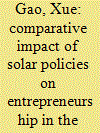|
|
|
Sort Order |
|
|
|
Items / Page
|
|
|
|
|
|
|
| Srl | Item |
| 1 |
ID:
179694


|
|
|
|
|
| Summary/Abstract |
The relationship between energy policies and entrepreneurship has long been a keen interest of researchers and policymakers. This study seeks to understand whether and how public policies affect—promote or hinder—the founding of new firms by examining the impact of solar regulatory and financial incentive policies on two types of new firm formation (i.e., start-ups and new subsidiaries) in the U.S. solar photovoltaic (PV) installation industry. This study finds that favorable regulatory policies are associated with an increased number of 2.8 start-ups and 1.6 new subsidiaries, and restrictive regulations (i.e., licensing policies) are associated with 2 fewer start-ups and 0.5 fewer new subsidiaries in a state. This study also finds that third-party ownership policy seems to have no impact on new firm formation. Furthermore, the relationship between financial incentives and new firm formation is not robust. This study suggests that policies that create a favorable business environment (or increase the barriers to business entry) may benefit (or hinder) different types of firms to varying degrees, as firms may have different levels of motivations, incentives, resources, and capacity to leverage these policies. Therefore, the distributional implications of policies should be taken into account in policy designs.
|
|
|
|
|
|
|
|
|
|
|
|
|
|
|
|
| 2 |
ID:
193744


|
|
|
|
|
| Summary/Abstract |
Households are key actors in mitigating climate change and their carbon footprints are unequally distributed due to differences in the scale and patterns of consumption. This study separately estimates household carbon footprints inequality in urban and rural areas of China from 2012 to 2018 and identifies the factors contributing to the evolution of the inequality by applying environmentally extended multiregional input-output analysis, unconditional quantile regression and Oaxaca-Blinder decomposition. The results show that the largest emission growth occurred among the 50th–80th percentile of urban emitters and the highest rural emitters. The Gini coefficient of urban household carbon footprints decreased from 0.463 to 0.439, whereas that of rural household carbon footprints increased from 0.447 to 0.459. Notably, the changes of household characteristics exacerbated carbon inequality, with income growth, increased car ownership, and smaller household size being the three primary factors, while the changes in consumption preferences and technological advancements reduced carbon inequality. The latter are dominant in urban households and the former are dominant in rural households. To mitigate climate change and reduce inequality, the government should not only encourage high-emitting households to adopt greener low-carbon consumption and lifestyles, but also promote low-carbon technology innovation to reduce carbon intensity.
|
|
|
|
|
|
|
|
|
|
|
|
|
|
|
|
| 3 |
ID:
166410


|
|
|
|
|
| Summary/Abstract |
Market demand is an important driver for inducing innovation, with many empirical studies supporting the demand-induced innovation hypothesis. Critiques of such studies, however, emphasize that new empirical evidence that can address existing empirical challenges is needed. Furthermore, existing literature disagrees about whether the locus of demand-pull policy matters. In this paper, we use empirical evidence from the distributed solar photovoltaic (PV) market in China to address the following questions: (1) Is there evidence of demand-induced innovation? (2) Does the effect of local demand-pull policy differ from the effect of non-local demand-pull policy on demand-induced innovation? To address these questions, we develop and analyze an original database of PV balance-of-system (BOS) patents in the distributed PV market filed between 2005 and 2014 in China. Our results support the demand-induced innovation hypothesis and suggest that only local demand significantly induces PV BOS innovations in the distributed PV market in China. The different effects of local demand and non-local demand emphasize the importance of local markets and local policies, lending some support to bottom-up approaches to clean energy governance.
|
|
|
|
|
|
|
|
|
|
|
|
|
|
|
|
|
|
|
|
|